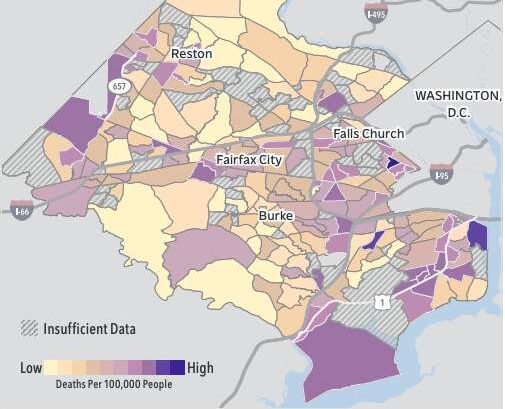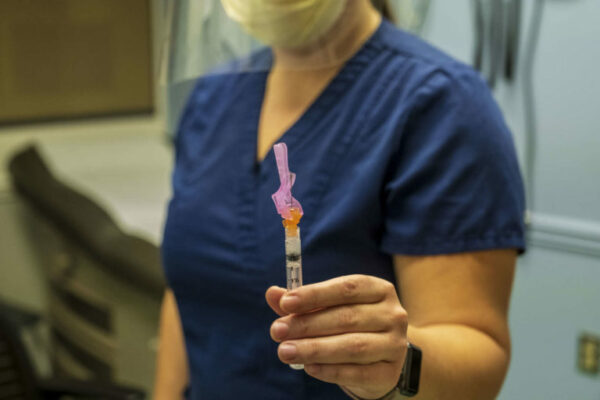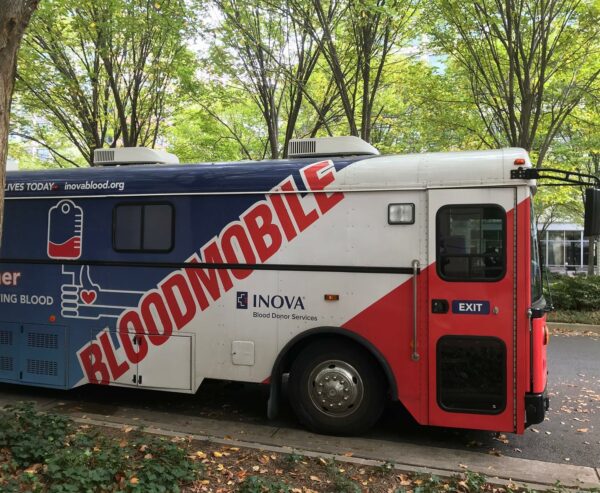
Black residents have experienced worse health outcomes than other populations across Northern Virginia, especially during the COVID-19 pandemic, a new report found.
Commissioned by the Northern Virginia Health Foundation (NVHF) and conducted by the Center on Society and Health at Virginia Commonwealth University, the Fairfax County section of the “Dying Too Soon” report found “stark” disparities across the county in the rates at which people die before the age of 75.
The report attributed the dramatic differences in life expectancies — from 76.5 years to 91.1 years — to an individual’s race, ethnicity and address, reflecting the influence of socioeconomic conditions on health outcomes.
According to the report, a lack of access to health care contributed to 66% of premature deaths in the county from 2015-2019 that were avoidable with preventative measures or treatment.
Throughout Northern Virginia, premature deaths are more concentrated within “islands of disadvantage,” where residents experience poor living conditions, higher mortality rates, and food and housing insecurity, the report says.
Residents of these neighborhoods are more likely to be people of color and immigrants, a disparity resulting from “the region’s history of segregation and systemic racism” and policies that “systematically block access” to health opportunities and increase exposure to unsafe health conditions, the report said.
Prior to the pandemic, Black people in Fairfax County had a premature death rate of 221.0 per 100,000 residents, exceeding the rates for white people (165.8 per 100,000), Hispanics (126.2 per 100,000) and Asians and Pacific Islanders (112.4 per 100,000).
Those disparities were consistent throughout the region, which “exhibits smaller racial-ethnic disparities” that other parts of the U.S., according to the report.
Though Fairfax County is often touted as one of the richest counties in the U.S., with a median income of $133,974, many of the wealthiest census tracts are located just a few blocks from islands of disadvantage.
In fact, the study says one census tract in Springfield has a premature death rate twice as high as that of a census tract in Franconia only two miles away. Each census tract also showed drastically different education and poverty rates and racial and ethnic compositions.
“I don’t think there’s a sense among the general public that these kinds of health inequities exist in a wealthy area like Northern Virginia, which in aggregate is doing quite well and has a very high quality of life,” Dr. Steven Woolf, lead study author and director emeritus of VCU’s Center on Society and Health, told FFXnow. “But when you zoom in like this to see what’s actually happening, neighborhood by neighborhood, you expose these these pockets of disadvantage that we want the public to know about.”
Census tracts with the highest premature death rates were in Seven Corners/Bailey’s Crossroads and Route 1 regions, according to the report’s summary. The study also reported that poverty rates in Seven Corners/Bailey’s Crossroads, Mount Vernon and Oakton “exceeded 20%, higher than poverty rates in countries like Estonia, Lithuania, Peru, Tajikistan, and Uganda.”
The Covid pandemic only worsened inequitable health outcomes, according to data collected in 2020-2021. The report says the county’s islands of disadvantage “experienced higher COVID-19 death rates,” and Northern Virginia as a whole saw “much higher” death rates among Hispanic and Black populations compared to Asian and white groups. Read More
Inova Health Systems still hopes to begin construction on its planned Franconia-Springfield expansion in 2023, even after encountering delays in Fairfax County’s rezoning process.
The nonprofit health care provider spent more than $40 million in 2020 to acquire property in a residential area near its Inova HealthPlex at 6355 Walker Lane, turning the site into a 21-acre campus.
To accommodate the development, the Fairfax County Board of Supervisors initiated a process in February 2021 for amending the county’s Comprehensive Plan. However, a scheduled public hearing on the proposed amendment before the planning commission is currently deferred, with a new date yet to be determined.
First announced in May 2020, the project is part of a region-wide overhaul by Inova to expand access and services, improve facilities and reinvest its nonprofit resources. Construction on an Alexandria expansion began in November.
The existing 145,000-square-foot health care complex in Franconia will remain, but three six-story medical buildings will be added to the site, under Inova’s proposal.
Plans call for two new towers with 425,000 square feet of space combined and 125-150 hospital patient beds, as well as the relocation of an emergency department, allowing the facility to provide other services, according to Tim Sampson, a land use attorney representing Inova.
The expansion also includes a 140,000-square-foot outpatient center and parking garage.
“The existing HealthPlex will be fully integrated into the new campus,” spokesperson Tracy Connell said in a statement. “The ER will move to the hospital and that space will be filled with another medical service.”
At a later point, a hospital wing and an approximately 80,000-square-foot office building could be added.
Lee District Supervisor Rodney Lusk said at an online community meeting last September that the expansion would serve the area’s need for more beds and facilities.
If the project gets the county’s approval, Inova expects construction to begin next year and finish in 2027.

As the winter surge continues following Christmas weekend, COVID-19 tests are becoming increasingly hard to come by in Fairfax County.
Many local testing facilities are booked until at least Thursday (Dec. 30). The shortage comes as COVID-19 cases surpass last winter’s surge. With another 1,441 cases recorded on Christmas Day, the county is now averaging 1,124 cases a day for the past week.
“We are hearing reports that some people are having difficulty in locating tests in Fairfax County,” a spokesperson for the county’s health department told FFXnow.
Testing demand appears to be unparalleled in the county as the emergence of the omicron variant fuels daily caseload increases.
Most testing sites that are part of national chains are fully booked until next week. CVS Pharmacy — which offers a variety of testing options — is booked at its Herndon, Leesburg, and Ashburn locations until next Thursday (Jan. 6). The Vienna location is booked through Saturday, Jan. 8.
My Dr. Pharmacy in Herndon is offering PCR tests for $150, with results released within one day of testing. But the earliest slot isn’t available until late Thursday afternoon.
High demand prompted Walgreens take down its registration page last night.
“We are currently using a virtual waiting room as a result of exceptional demand and to give you the best possible online experience,” the landing page stated.
The page now appears to be back up, but as of this morning (Tuesday), all stores in Fairfax County have been fully booked, with the nearest availabilities in Arlington and Ashburn.
Inova Health Systems is urging residents to seek out a community testing site or home test kit instead of getting tested for COVID-19 at the emergency room.
“Inova Emergency Departments are prioritizing patients with medical conditions requiring emergency care and those with critical illness. We strongly discourage patients who are asymptomatic or have mild symptoms from coming to ER,” INOVA Health tweeted yesterday (Monday) afternoon.
Efforts to set up a community testing site are underway.
County public health officials are encouraging residents to seek out multiple testing options, including clinics, kiosks urgent care facilities, and drive-through sites. The Virginia Department of Health offers an online portal to find testing sites in the state.
The shortage has prompted many residents to purchase tests online.
Strains are being felt nationwide. President Joe Biden lamented the testing shortage yesterday, as omicron and holiday travel resulted in long lines at some testing facilities.
Biden noted that his administration aims to increase testing availability with new federal testing sites and the purchase of 500 million at-home rapid coronavirus tests, which will be delivered to residences beginning in January.

Local blood supplies have reached critically low levels, creating a potential crisis with hospitals operating at maximum capacity, Inova Health Systems reports.
The dangers of this imbalance between supply and demand became painfully clear last week, when the nonprofit health care system drained its Type B supplies and had to switch to Type O blood in order to stabilize one patient, according to an Inova spokesperson, who described the current need for blood donors as “urgent.”
The patient suffered significant blood loss that triggered a massive transfusion protocol (MTP), requiring medical workers to literally run units of blood, plasma, and platelets from a blood bank to the emergency room, explains Heather Wade, the donor recruitment manager for Inova Blood Donor Services.
“As clinicians, we strive to provide patients with their blood type,” Wade said. “It’s a matter of overall safety, but when that supply has been diminished, we then need to revert to caring for the patient with Type O blood product.”
Inova is seeking donors of all blood types, but it is especially in need of Type B and O blood.
As of Thursday (Oct. 14), Inova was completely out of both B-negative and AB-negative blood, with just 10 of the 90 B-positive units needed in stock, according to its red blood cell inventory.
Supplies are low in part because Type B blood is rare, comprising only about 10% of the U.S. population, according to the American Red Cross.
Type O blood is particularly valuable, because O-negative can be used for all patients. O-positive blood can help about 84% of patients and is carried by Fairfax, Arlington, and Loudoun county emergency responders for on-site transfusions, Wade says.
Inova currently has just 46 available units of O-positive blood and 68 units of O-negative blood.

Wade says Inova needs about 200 blood donations per day to maintain a sufficient, stable inventory to support the 4.5 million people it serves in Northern Virginia, Maryland, and D.C..
“The actual donation takes 15 minutes, and it can save three lives in our community,” Wade said. “Whether you donated in Sterling and the patient’s in Alexandria, Virginia, you’re helping someone in our Northern Virginia area.” Read More
Inova has temporarily closed four of its urgent care centers, including ones in Reston (1488 Northpoint Village Center) and Tysons (8357 Leesburg Pike), to manage an influx of patients without overwhelming exhausted staff.
Inova told FFXnow that it has consolidated staff from the shuttered urgent care centers at other sites “to better accommodate patient volume.” The other centers that have been closed are in Arlington, as reported by ARLnow, and Purcellville.
According to Inova’s website, urgent care centers in Vienna, Centreville, West Springfield, and Chantilly remain open.
“These closures are temporary and we anticipate they will reopen by the end of the year or sooner,” Inova Health Systems spokesperson Tracy Connell said by email.
Typically open seven days a week from 8 a.m. to 8 p.m., Inova’s urgent care centers provide various same-day medical services, including treatment for minor illnesses and injuries, X-rays, sports physicals, lab tests, and most recently, evaluations for COVID-19.
The temporary closures came in response to “significantly high volumes” of patients that Inova has been experiencing, Connell says, noting that other health systems across the country have encountered the same trend.
On top of an influx of COVID-19 cases fueled by the Delta variant, Virginia hospitals have reported getting more patients with more medically complex conditions, including people who delayed seeking care last year due to stay-at-home orders and fear of contracting the coronavirus, according to Virginia Mercury.
At the same time, many hospitals have been hit by staffing shortages as nurses and other medical professionals strained by months of working through the pandemic opt to quit or retire.
According to Connell, that has not been an issue for Inova, even though it was the first major health care system in Northern Virginia to issue a COVID-19 vaccine mandate for employees.
“We are not experiencing a staffing shortage, but we are actively working to manage staffing needs so as to avoid fatigue and burnout among our team members who have performed at an extraordinarily high level throughout the pandemic,” she said.
Over 99% of Inova employees received at least one vaccine dose by the organization’s Sept. 1 deadline. 86 workers — just 0.4% of Inova’s workforce — “chose to leave the organization rather than comply with our vaccination policy,” Connell says.


